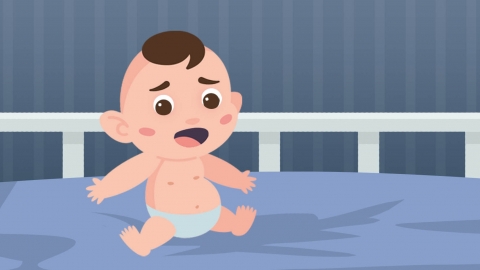What does it mean when a baby rolls their eyes upward?
Generally, a baby rolling their eyes may be caused by an underdeveloped nervous system, uncoordinated eye muscle regulation, conjunctivitis, febrile seizures, epilepsy, or other reasons. It is recommended to seek timely medical attention and follow the guidance of a physician for treatment. Detailed explanations are as follows:

1. Underdeveloped Nervous System
A baby's nervous system has not yet fully matured, and the brain's control over eye movement is relatively weak. During light sleep, the baby may easily exhibit upward eye movement or rolling the eyes, which is a normal physiological phenomenon. Parents need not provide special intervention. As the baby grows older and the nervous system gradually develops, this phenomenon will naturally decrease and eventually disappear.
2. Uncoordinated Eye Muscle Regulation
In the early stages of development, a baby's eye muscles may not function in perfect coordination. Temporary abnormal contractions of the muscles around the eye can sometimes cause upward eye movement, resulting in the appearance of rolling the eyes. Parents should avoid letting the baby stare at bright lights or fixed objects for prolonged periods. They can guide the baby through eye movement exercises, such as slowly moving colorful objects in front of the baby's eyes, to promote coordinated development of the eye muscles.
3. Conjunctivitis
Conjunctivitis is often caused by bacterial, viral, or chlamydial infections. Invading pathogens lead to conjunctival congestion and swelling. The inflammatory irritation can affect the normal function of the eye muscles and nerves, causing the baby to roll their eyes. Symptoms may also include red eyes, increased eye discharge, and tearing. Patients should follow medical advice to use medications such as tobramycin eye drops, ganciclovir ophthalmic gel, or erythromycin eye ointment for treatment.
4. Febrile Seizures
Febrile seizures typically occur during a rapid rise in body temperature, especially when the temperature exceeds 38.5°C. This is because the baby's nervous system is underdeveloped, and high fever stimulates abnormal electrical activity in brain nerve cells, leading to seizures that cause upward eye movement and eye rolling. Symptoms may also include loss of consciousness and cyanosis of the lips. Patients may use medications such as acetaminophen suspension drops, ibuprofen suspension, or midazolam injection under a doctor's guidance for treatment.
5. Epilepsy
Epilepsy may be related to various factors including genetic predisposition, brain injury, infection, and metabolic abnormalities. During an epileptic seizure, abnormal synchronous discharge of neurons in the brain disrupts normal nervous system function, resulting in symptoms such as upward eye movement and eye rolling. Symptoms may also include generalized muscle rigidity, convulsions, and frothing at the mouth. Patients can use medications such as valproate syrup, carbamazepine tablets, or levetiracetam tablets under the advice of a doctor for treatment.
In daily life, attention should be paid to the baby's personal hygiene, especially eye cleanliness, to prevent infections. Additionally, the baby's clothing should be adjusted according to weather changes to prevent colds and fever. It is recommended to take the baby for regular health checkups to monitor growth and development, enabling early detection of any potential issues.







